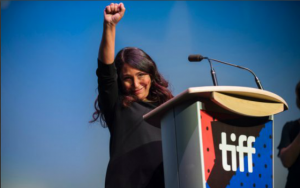METRO CANADA: Haifaa Al-Mansour leads surge of female directors at TIFF
 By Richard Crouse – Metro Canada
By Richard Crouse – Metro Canada
To direct the exterior scenes of the award-winning 2012 movie Wadjda filmmaker Haifaa Al-Mansour, the first woman from Saudi Arabia to make a feature film, was hidden away inside a van. Her home country does not allow women to work in public with men so she watched the action on monitors and communicated with her actors via walkie-talkie.
“I remember the first day she came on the Mary Shelley set she started crying because she’d never been on a film set,” says Elle Fanning who stars in Al-Mansour’s latest movie, Mary Shelley. Shot on location in Dublin and Luxembourg, it is an exploration into the Frankenstein author’s battle to assert her voice in 19th-century England.
“One of the most interesting things about approaching this movie for me was the fact that (Al-Mansour) had gone through a very similar journey to Mary Shelley in her creative process,” says Douglas Booth who plays Percy Shelley. “She came from a world where she had to break through misogyny and people thinking she didn’t have a voice or didn’t deserve a voice because of her gender.”
Mary Shelley is playing at the Toronto International Film Festival this year placing Al-Mansour alongside filmmakers like Alanis Obomsawin, Agnès Varda, Jennifer Baichwal, Dee Rees, Greta Gerwig, Brie Larson, Molly Parker and other female directors who make up one-third of all films programmed at the fest this year.
“There is something different that happens on set when I am being directed by a woman,” says Stronger star Tatiana Maslany. “The cameras aren’t the gods. There isn’t idolatry of the machinery. I don’t know if that is a female thing specifically or just the women I have worked with. There is a deep interest in mining the internal life of something, the dynamic between men, between women, between a person and their surroundings, between a person and their own body. It’s not exclusive to women but it is something that I feel is a new thing I’m experiencing and it is often on female-led sets.”
Fanning says she often works with female directors like Sofia Coppola, who directed her in The Beguiled, but “it’s not a strategic thing. Without thinking about it I worked with four women directors in a row.”
“The way women tell stories about women – it’s real,” she says. “It needs to be shown, especially for young girls, to relate to all different types of women. I think it’s important to have women characters that are true to how women are and women directors get that.”
To ensure that a new generation of filmmakers like Al-Mansour are given a chance to have their voices heard TIFF has made a five-year commitment to increasing participation, skills and opportunities for women behind and in front of the camera. Through the initiative Share Her Journey TIFF is placing emphasis on mentorship, skills development, media literacy and activity for young people. To help them hit their financial goal of $500,000 for 2017 donations can be made through tiff.net.
“By supporting female filmmakers, you can make sure the stories women are longing to hear are told truthfully,” says Share Her Journey ambassador Omoni Oboli on the TIFF website. “Not only does it empower the filmmakers, but it also helps an audience to see the possibilities of women, instead of our limitations.”
